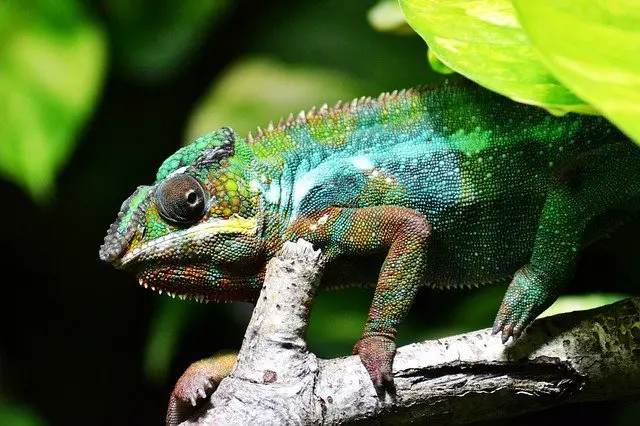What you Need to Know
Chameleon diets differ depending on their habitat, type, and size, as well as if they live in the wild or inside your home as a beloved pet.
They’ll eat crickets, cockroaches, and yes, even wax worms!
What you Should Know
Research suggests that chameleons are not picky when it comes to the types of insects they will whip with their long sticky tongues. In the wild, they are known to eat whatever they can get ahold of, such as flies, snails, slugs, grasshoppers, and some will even eat other small lizards, birds, and rodents.
But when you’re keeping a chameleon pet, then you should know exactly what they love so you can provide a healthy meal for your chameleon that they will greatly enjoy.
As they are used to eating a varied diet in the wild that is primarily based on what a chameleon can catch, they will expect the same kind of diet in your home.
Make sure you have different kinds of insects, veggie greens, and even a pinkie mouse from time to time to boost their protein consumption.
What are Wax Worms
Wax Worms, despite their name, are not worms at all. They are actually caterpillars that will burst open one day and become a wax moth. Yes, that is right. They turn into winged little moths and flutter about. That is, those that are not fed to you chameleon.
Why are they called ‘wax worms’? Because they actually eat beeswax and honey. That is why they are full of fat and a great food addition for your chameleon.
What’s more, they are easy to keep, as they breed fast. They are low maintenance and can survive cold temperatures. So, if you are considering breeding wax worms so your pet chameleon can have a constant stream of tasty treats, then go for it.
Another awesome thing about wax worms, although it doesn’t mean much for your pet, is that wax worms are actually capable of biodegrading plastic! Have this in mind if you decide to keep them inside a plastic bag for some reason, as they will chew through it and they will chew fast.
How to Go about Feeding Chameleons Wax Worms
[su_box title=”Our Chameleon Care Guide”]Want to know all there is about keeping Chameleons? Want to keep them healthy and happy? If the answer is yes then you should have a look at our comprehensive guide to keeping these wonderful creatures. Just Click Here.[/su_box]
So, can chameleons eat wax worms?
As part of their diet, chameleons will often choose all kinds of worms. This includes wax worms, earthworms, mealworms, silkworms, and others.
But, if you do choose to feed your chameleon wax worms, just make sure you don’t overdo it. According to Wikipedia, wax worms are rich in fat but lack important nutrients other insects provide. So, unless you want a chubby chameleon (please, don’t), then ensure you include other insects and veggies into your lizard friend’s diet.
ExoticDirect suggests that you keep wax worms, along with Morio worms, butter-worms, bamboo-worms, and Pachnoda grubs, as a nice little treat for your chameleon and not as their main source of food.
Think of it like a fatty little bag of chips you love to chump down on after lunch, only it’s filled with wax worms. You won’t eat chips all the time, right? So, your chameleon shouldn’t eat wax worms all the time either.
A nice balanced diet goes a long way for you and for your pet.
Depending on the type of chameleon you have, yours might even like various veggies. For example, veiled chameleons like to eat all kinds of greens (collard greens, kale, mustard greens, dandelion greens…)
So, share your greens with your chameleon and you will both be happier.
What Else is Important
If you’re wondering how often your chameleon should eat, then here is the breakdown.
The amount of food you need to provide for your chameleon will greatly depend on how old they are. Much like with cats and dogs.
So, a young chameleon that has up to 6 months needs to earth two or three times a day. Give those babies a constant stream of food for about 5 minutes, but wait for them to swallow first!
As your pet grows, their eating habits lessen. For a chameleon that is between 6 and 12 months, 5 minutes of feeding time once a day is enough.
Then, once they slowly stop growing altogether, reaching 12 months, they become an adult. For an adult chameleon, it’s all about those nutrients and how much their diet varies. At this point, you want to feed your colorful friend three times a week for those 5 minutes.
Final Word
As you can see, wax worms as a fatty add-on to your chameleon’s diet needs are a perfectly good choice. And your lizard friend will be thankful for their varied and nutritional diet.
Waxworms are a great treat!





